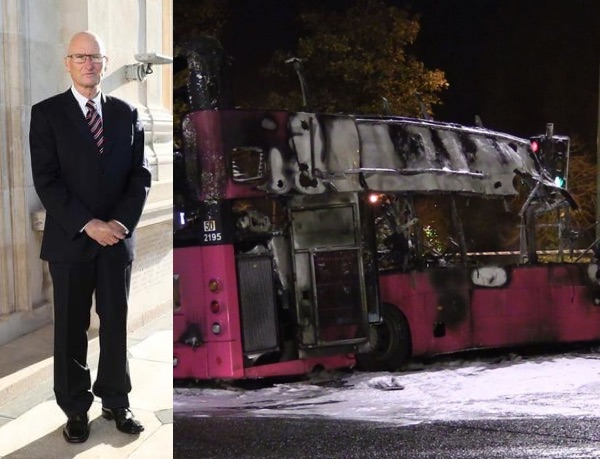
A spokesperson for one of the main loyalist organisations has said he no longer supports the political process in a statement which could further set the scene for a move by London to trigger the collapse of the Brexit accords.
In a lengthy statement, Billy Hutchinson, the leader of the UVF-linked Progressive Unionist Party, said the Irish Protocol of Brexit has shattered his confidence that unionism holds a veto over political change in the north of Ireland.
The statement comes despite a poll this week showing a majority of both the unionist and nationalist communities in the North of Ireland is in favour of retaining the Protocol, and the special status with the EU it confers.
In a detailed statement released today, the former UVF (Ulster Volunteer Force) commander says he is committed to peace in the north of Ireland but not the political process.
An attack on a bus overnight in the Newtownabbey area of Belfast by masked loyalists formed a backdrop to the statement. It is the second hijacking and burning of buses within a week which have been blamed on the UVF.
In his statement, Hutchinson claims that the principle of consent of the Good Friday Agreement is a “snare” aimed at protecting “merely the symbolism rather than substance of the Union”.
He also hit out at “nationalism’s political aspirations” which he argued was being supported by the political process in the North. He said loyalists had been “morally blackmailed” into supporting it.
He insisted the Good Friday Agreement is being interpreted in favour of nationalism, and set out a list of demands which must be implemented in order to “correct” this alleged imbalance.
These include legislation to “protect the substance of the Union”, an “equitable” expansion of the cross-community consent mechanism and the “restoration” of Article 6 of the 1800 Acts of Union, under which Ireland was annexed.
Six weeks ago, Hutchinson was one of four unionist party leaders who formed a pact to bring down the Protocol with the support of senior Tories.
His statement comes amid a widespread belief that the British government intends to trigger the ‘nuclear option’ of Article 16 of the Irish Protocol, effectively collapsing the Brexit withdrawal and trade agreements.
‘Serious societal difficulties’ is one of the few grounds under which the article can be triggered.
It is widely believed British PM Boris Johnson is attempting to orchestrate a renegotiation of Brexit and bolster his support by igniting fresh conflict with the European Union.
The Tory cabinet has faced criticism recently over allegations of corruption in the signing of Covid-19 contracts. Opposition leaders have accused Johnson of using Brexit tensions to distract voters from the ‘sleaze’ scandal with anti-EU and anti-Irish rhetoric.
Former British Prime Minister John Major warned earlier this week that suspending parts of the Brexit deal would be dangerous and “colossally stupid”. He said the move would damage relations with the EU and US and could further destabilise the peace process.
Sinn Féin leader Mary Lou McDonald also warned London against playing a “very dangerous game”.
On the prospect of London triggering Article 16, Ms McDonald said: “It would demonstrate just again colossal bad faith and demonstrate again that Ireland, the north of Ireland in particular, is collateral damage in the Tory Brexit as they play games and play a game of chicken with the European institutions.
“I would also say that if the British government imagine that they hold all of the cards they are wrong and they’re playing a very, very dangerous game, up to and including perhaps jeopardising the entire withdrawal agreement.”
McDonald said the EU proposals for addressing issues with the protocol had gone further than many had anticipated.
“But, you know, everything has its elastic limit,” she told the BBC.
“The reality now is the ball is at the foot of Boris Johnson and his government, and they need to act in good faith and they need to adopt a position that is serious and that has a long-term view.
“If they don’t, well, then the consequences, I think, will be very grave indeed.”
![[Irish Republican News]](https://republican-news.org/graphics/title_gifs/rn.gif)
![[Irish Republican News]](https://republican-news.org/graphics/title_gifs/harp.gif)

